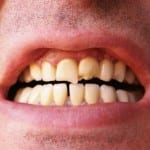 At City Dental Leeds, we like to keep things classy and with our amazing porcelain crowns, we can restore damaged teeth without detracting from the stunning natural beauty of your smile.
At City Dental Leeds, we like to keep things classy and with our amazing porcelain crowns, we can restore damaged teeth without detracting from the stunning natural beauty of your smile.
About dental crowns
Dental crowns are restorations, which are called into action when a tooth is damaged, broken or decayed. Crowns are sometimes called caps and this is because they sit on top of the natural tooth. If your tooth is infected, you’ve had an injury or accident and the tooth is broken or severely damage or you have a very large cavity, you may be advised to have a new crown.
Crowns are custom-made for the patient to ensure that they fit perfectly and they can be made from various different materials. We like to use porcelain crowns because they match the colour of the natural teeth and they also have a beautiful sheen.
Crown treatment
Before a crown is made, the tooth is prepared and this involves taking away all the rotten tooth tissue and shaping the tooth in preparation for the crown. Dental putty is used to make a mould of the tooth and this is then sent away. The crown is then manufactured by an expert dental technician. When your new crown is ready, we will fit in onto the tooth and then fix it firmly using strong adhesive. Sometimes, in the event that the tooth is infected, root canal treatment will be carried out prior to the crown being fitted; this procedure helps to remove infected pulp tissue and prevent the spread of infection through the tooth.
Crowns offer many benefits and they usually improve the aesthetic of the smile, as well as providing additional strength and functionality.
Crowns should last around 10 years provided that you look after the tooth well.












 It sounds like a medieval torture, but a root canal is a really painless and efficient way of freeing a tooth of infection. A Leeds Central dentist explains that a root canal is a very special way of saving a tooth that usually would have been lost. It all comes down to infections, which are usually caused by bad bacteria getting into the inner chamber of the tooth. This can be through infected gums or most likely a crack in the tooth itself, once in there the infection tends to keep coming back. Your dentist needs to get right to the centre of the problem, so they will start off with a little gel on the gums to deaden the sensation of the needle for the local anaesthetic. Then they will drill out the centre of the tooth and it will look like you have a hollow tooth, next will come some scraping of the infected area to get out the root of the bacteria build up. Next they will treat the area with an intense light that kills off any bacteria still lurking around. The hole is then filled in with a specially prepared filler, which contains not just a hard material to replace your enamel, but an anti bacterial formula to keep future infections away. The crack will also disappear and you will be able to use the tooth as soon as the soreness wears off in a few days, the important thing is that the tooth will be saved.
It sounds like a medieval torture, but a root canal is a really painless and efficient way of freeing a tooth of infection. A Leeds Central dentist explains that a root canal is a very special way of saving a tooth that usually would have been lost. It all comes down to infections, which are usually caused by bad bacteria getting into the inner chamber of the tooth. This can be through infected gums or most likely a crack in the tooth itself, once in there the infection tends to keep coming back. Your dentist needs to get right to the centre of the problem, so they will start off with a little gel on the gums to deaden the sensation of the needle for the local anaesthetic. Then they will drill out the centre of the tooth and it will look like you have a hollow tooth, next will come some scraping of the infected area to get out the root of the bacteria build up. Next they will treat the area with an intense light that kills off any bacteria still lurking around. The hole is then filled in with a specially prepared filler, which contains not just a hard material to replace your enamel, but an anti bacterial formula to keep future infections away. The crack will also disappear and you will be able to use the tooth as soon as the soreness wears off in a few days, the important thing is that the tooth will be saved. Tooth decay is caused by a build up of a filmy, sticky substance called plaque that coats the teeth and releases acid which erodes the protective enamel layer. This causes small holes called cavities to appear in the teeth allowing bacteria to penetrate to the sensitive inner area of the tooth. Inside the tooth is the dental nerve housed in a casing of a softer material called pulp. If bacteria gets into this part of the tooth it can cause an infection that will not only be painful but could result in the death and eventual loss of the tooth.
Tooth decay is caused by a build up of a filmy, sticky substance called plaque that coats the teeth and releases acid which erodes the protective enamel layer. This causes small holes called cavities to appear in the teeth allowing bacteria to penetrate to the sensitive inner area of the tooth. Inside the tooth is the dental nerve housed in a casing of a softer material called pulp. If bacteria gets into this part of the tooth it can cause an infection that will not only be painful but could result in the death and eventual loss of the tooth.

